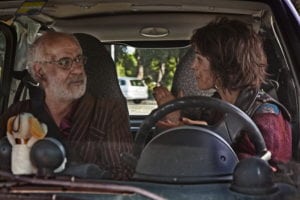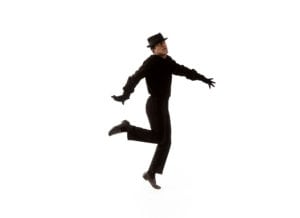
This year’s Louisville Jewish Film Festival, which marks the 20th anniversary of the event, features more lighter, entertaining films, such as the Italian comedy Let Yourself Go! The festival opens February 3 at Bellarmine University.
In the 14 years that Marsha Bornstein has run the Louisville Jewish Film Festival, she has rarely opened the season with a documentary. In fact, she can only think of one other time.
But she’s doing it this season.
The opening night film slated for Saturday, February 3, at the Cralle Theatre, Bellarmine University, is Sammy Davis Jr.: I’ve Gotta Be Me, a 100-minute, sometimes light, sometimes serious look at the famed song and dance man who converted to Judaism.
Typically, documentaries don’t draw big crowds compared to dramas and comedies, said Bornstein, director of the film festival. That makes opening with SD Jr. a gamble.
But not a big one, she believes.
“This is different,” Bornstein said of the film. “It’s so entertaining, and it has so much meaning within the context of when he (Davis) lived.”
Opening night includes a catered reception and a live performer singing Rat Pack music.
The 2018 Jewish Film Festival is celebrating its milestone 20th season this year. Running from February 3 to 25, 11 films are on this year’s schedule, although two of those offerings are compilations of Israeli short films.
Opening with a documentary isn’t the only surprise this year. Bornstein said this is a bumper year for comedies, a genre for which Israeli filmmakers, whose work makes up much of the festival, simply aren’t well known.
For instance, The Pickle Recipe, a light-hearted picture about a debt-ridden Detroit man, Joey, who turns to his shady uncle Morty for help paying for his daughter’s bat mitzvah. Morty agrees, but only if Joey steals his grandmother’s secret pickle recipe. JOFEE Fellow Michael Fraade will be at the screening with a pickle-tasting demo.
Then there’s Keep the Change, a romantic comedy with a twist.
It’s the story of two autistic people who meet at a support group.
The twist? Both actors – amateurs – really are autistic.
Bornstein said her audiences have been asking for lighter films at the festival.
“They want a film for different reasons,” she said. “You can’t have all Holocaust films. You have to have some comedies, some English genres (no subtitles). You have to put together an outstanding package.
“I have told the [selection] committee to look at a film, not only through their eyes, but the community’s eyes,” she added. “What does the community want to see?”
That said, there also are some darker pictures in this year’s festival. Bornstein’s personal favorite is 1945, a black & white Hungarian movie about two strangers – Orthodox Jews – who arrive by train as the inhabitants happily prepare for a wedding. Who are they? Why are they there? Have they come to claim the property of Jewish neighbors who perished at Auschwitz?
“I like the heavy films,” Bornstein said.
This year’s pictures come from Israel, the United States – there are more American films than usual this year – Hungary, France, Italy and Belgium.
They will be screened primarily at the Village 8, though the festival returns to the Speed Cinema for a second year with 1945 and a series of short films by students of the Steve Tisch School of Film and Television in Tel Aviv. Adath Jeshurun will host The Pickle Recipe (Cantor David Lipp also is sponsoring the Tisch shorts) and The Temple will screen shorts from the Ma’aleh School of Television, Film & Arts in Jerusalem.
In a new partnership this year, the Louisville Children’s Film Festival will co-sponsor Belle and Sebastian, a French film, dubbed in English, based on a famous children’s book about a boy and his special connection to a dog that the neighbors suspect of killing their livestock. The story unfolds amid the backdrop of Nazi-occupied France.
“We wanted to present some films that would show children the world without having to travel far,” said Martha Nichols, director of the Children’s Film Festival, which is in its first season.
Both she and Bornstein were interested in bringing Belle and Sebastian, a story that generations of French children were raised on, to Louisville. But there was another reason Nichols wanted to partner with the Jewish Film Festival: Bornstein herself.
“It’s a very successful festival, and Marsha is a leader in bringing interesting cinema to Louisville,” said Nichols, who also is a professor of French, “so as a first-timer going through this, I really wanted the opportunity to work with her and to learn from her.”
The Children’s Film Festival runs from February 24 to 26.
This year’s film offerings at the Jewish Film Festival were culled from 45 pictures, all of which Bornstein screened before selecting 25.
From that batch, the 17-member selection committee screened them online before meeting with their notes and selecting up to 14 in case some pictures weren’t available. The committee did not know how much the films cost when making its choices, and it doesn’t always choose the films Bornstein would like.
But that is as it should be.
“I have great respect for the committee,” Bornstein said. “They really have done a great job in selecting films, and they’re very diverse. I don’t want them to think like me.”



